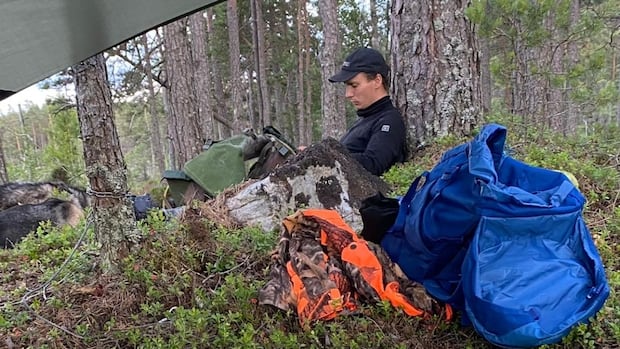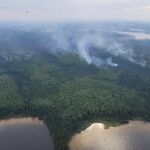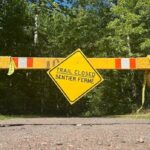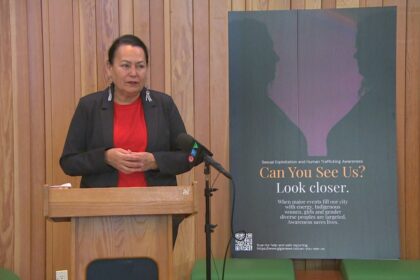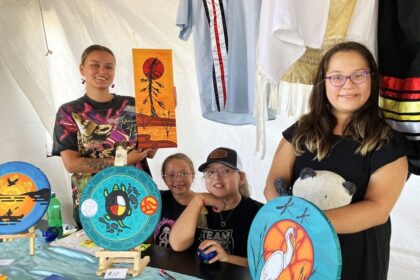ManitobaStaff at a remote lodge in polar bear country on Manitoba’s Hudson Bay coastline were surprised and impressed early last week when a man with a backpack and a dog walked up to the front door for the first time ever.Steffen Skjottelvik’s gear was recovered from water in the remote area, says family spokespersonBryce Hoye · CBC News · Posted: Aug 22, 2025 2:57 PM EDT | Last Updated: 6 hours agoSteffen Skjottelvik, seen here in an undated photo provided by family, was last heard from Aug. 14. Search crews have focused on an area of the Hayes River in recent days. (Submitted by family spokesperson Christian Dyresen)Staff at a remote lodge in polar bear country on Manitoba’s Hudson Bay coastline were surprised and impressed early last week when a man with a backpack and a dog walked up to the front door for the first time ever.It was Steffen Skjottelvik, a Norwegian trekker, who went missing a few days later after leaving the lodge for the remaining leg of his trip that would’ve required crossing the fast-moving Hayes River.Skjottelvik allegedly relayed to lodge staff that before arriving there on Aug. 11 that “he walked past 200 polar bears,” said Adam Pauls.”He’s the first person in the history of us operating that lodge that has walked up to the lodge. Like, nobody just shows up. The only way you get there is by air,” said Pauls, CEO of Churchill Wild, which operates Nanuk Polar Bear Lodge. “It’s hard for other people to really understand how remote that area is. It’s an area the size of California without settlements.” Skjottelvik, who RCMP have called an experienced wilderness traveller in Norway, started his trek from Fort Severn, Ont., on July 25, and was expected to arrive in York Factory, Man., about 850 kilometres northeast of Winnipeg, on Aug. 15.The 300 kilometres of terrain between the two northern communities is dominated by soupy bogs that are challenging to cross on foot.The 29-year-old set out to travel from James Bay to Alaska in a trek documented on Facebook called Steffen’s Great Canadian Journey. His uncle, Lars Jorgen Sorensen, has said Skjottelvik prepared for years for this trip. The search continued Friday for Skjottelvik, who was last heard from on Aug. 14, one day after he left Nanuk, according to RCMP. He was expected to arrive in York Factory, Man., the following day, but never did.Ever since, a group of volunteers — mainly from Fort Severn First Nation, Gillam, Man., and other communities in the area — have helped lead a search. RCMP and Manitoba Conservation officials are also involved.In recent days, Skjottelvik’s gun and waterlogged backpack have been recovered near the Hayes River, which flows through a treacherous muskeg landscape. RCMP have said the river is one of the fastest in Canada, and water levels can dramatically shift four metres in depth between low and high tide. It’s at the Hayes where RCMP have said GPS co-ordinates placed Skjottelvik on the day he disappeared.Loved ones ‘cling to … hope’It all has his family preparing for the worst.On Friday, about 100 relatives, friends and community members attended a service at Holmsbu kirke, a church just outside Oslo, Norway, “to gather in hope” for Skjottelvik, said Christian Dyresen.”The fact that the police have now confirmed that [his] backpack and gear has been in water for some time gives the family, sadly, the realization that there is little hope,” Dyresen, a Skjottelvik family spokesperson, told CBC News.Steffen Skjottelvik is seen in an undated Facebook image. He left Fort Severn, Ont., on foot on July 25 with his two dogs and the intention to arrive in York Factory, Man., on Aug. 15, but never made it there. (Steffen Skjottelvik/Facebook)”But … they cling to the hope and they are doing what they can to ensure that the search is going on,” he said, speaking from outside the church. “Whatever it takes, they are focusing on finding Steffen.”Various campaigns to raise money for the search effort continue in Norway and Manitoba.’Super impressed’ with volunteers: CEOChurchill Wild CEO Pauls, who is based in southern Manitoba, said he believes Skjottelvik arrived at Nanuk Polar Bear Lodge on Aug. 11 with one of his two dogs. The other, the trekker suggested to staff, took off during an encounter with wolves, Pauls said.”When he showed up, he was a little under-slept. He had some oats left for food, so he didn’t have a lot of options there, so that’s why we took him in,” said Pauls.Pauls said he doesn’t know how Skjottelvik planned to cross the Hayes when he left the lodge on Aug. 13.He also did not have a tent and had been sleeping under a fly or tarp, said Pauls.”It sounded like the nights weren’t that restful, which I could understand. There’s a lot of polar bears. There’s wolves, black bears, wolverines,” he said.Pauls said it was impressive how quickly and efficiently volunteer searchers from Fort Severn leapt into action. They had chartered a helicopter and were searching for Skjottelvik within less than 48 hours of him failing to reach York Factory.”Super impressed with the First Nations from Fort Severn … manufacturing a program within a couple days and beating the response time of our government,” said Pauls.”I’m not a search and rescue expert. But obviously your first days are the most important and the people that got there first were the people from Fort Severn.”Pauls said the lodge donated jet fuel to the Fort Severn searchers’ chartered helicopter. They also provided them with a newly purchased thermal imaging drone Pauls said was at Nanuk. RCMP have had one officer in the area since Monday, working with the volunteer searchers.Sgt. Paul Manaigre, a spokesperson for the RCMP in Manitoba, said the officer flew a thermal imaging drone from the Gillam detachment on Monday night to look for Skjottelvik.Earlier this week, Manaigre said an RCMP request for more resources, including from the Canadian Rangers, was denied due to safety concerns.RCMP had no updates Friday on additional resources for the search.ABOUT THE AUTHORBryce Hoye is a multi-platform journalist with a background in wildlife biology. He has worked for CBC Manitoba for over a decade with stints producing at CBC’s Quirks & Quarks and Front Burner. He was a 2024-25 Knight Science Journalism Fellow at MIT. He is also Prairie rep for outCBC. He has won a national Radio Television Digital News Association award for a 2017 feature on the history of the fur trade, and a 2023 Prairie region award for an audio documentary about a Chinese-Canadian father passing down his love for hockey to the next generation of Asian Canadians.Selected storiesEmail: bryce.hoye@cbc.caFacebookMore by Bryce Hoye
Friday, 6 Feb 2026
Canada – The Illusion
Search
Have an existing account?
Sign In
© 2022 Foxiz News Network. Ruby Design Company. All Rights Reserved.
You May also Like
- More News:
- history
- Standing Bear Network
- John Gonzalez
- ᐊᔭᐦᑊ ayahp — It happened
- Creation
- Beneath the Water
- Olympic gold medal
- Jim Thorpe
- type O blood
- the bringer of life
- Raven
- Wás’agi
- NoiseCat
- 'Sugarcane'
- The rivers still sing
- ᑲᓂᐸᐏᐟ ᒪᐢᑿ
- ᐅᑳᐤ okâw — We remember
- ᐊᓂᓈᐯᐃᐧᐣ aninâpêwin — Truth
- This is what it means to be human.
- Nokoma


